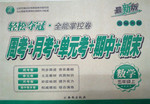题目内容
She resist _____ because she was not sure what she would be faced with.
[ ]
A. carrying off
B. being carried off
C. to carry off
D. to be carried off
B. being carried off
C. to carry off
D. to be carried off
B

练习册系列答案
 轻松夺冠全能掌控卷系列答案
轻松夺冠全能掌控卷系列答案
相关题目